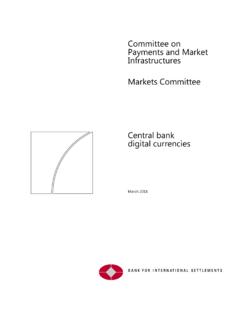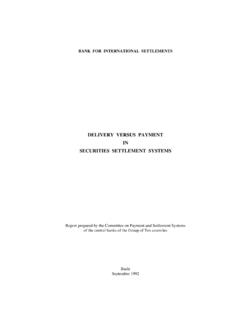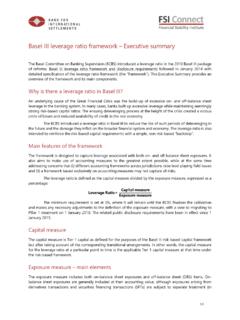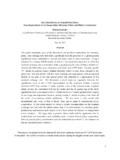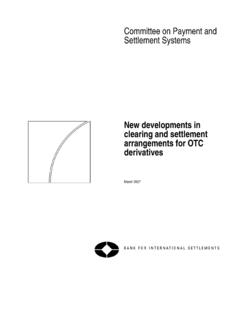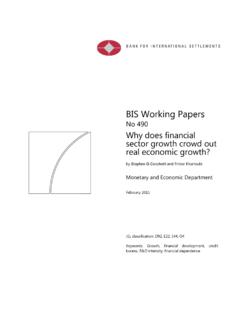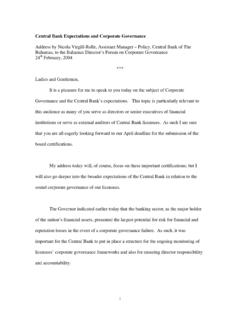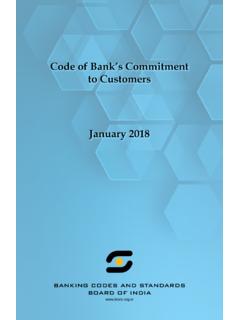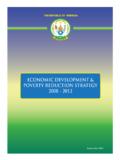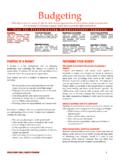Transcription of Sound pratices: implications of fintech …
1 Basel Committee on Banking Supervision Sound Practices implications of fintech developments for banks and bank supervisors February 2018 This publication is available on the BIS website ( ). bank for International Settlements 2018. All rights reserved. Brief excerpts may be reproduced or translated provided the source is stated. ISBN 978-92-9259-128-1 (online) implications of fintech developments for banks and bank supervisors iii Contents Executive summary .. 4 Part I Introduction .. 8 Part II fintech developments and forward-looking scenarios.
2 8 A. What is fintech ? .. 8 B. What are the key fintech products and services? .. 9 C. How big is fintech ? .. 10 D. Comparison with previous waves of innovation and factors accelerating 13 E. Forward-looking scenarios .. 14 Part III implications for banks and banking systems .. 21 A. Opportunities .. 22 B. Key risks .. 24 C. implications of using innovative enabling technologies .. 29 D. Focus on outsourcing and partnering risk .. 32 Part IV implications for bank supervisors and regulatory frameworks .. 33 A. Increased need for cooperation .. 33 B. bank supervisors internal organisation.
3 34 C. Suptech opportunities .. 35 D. Continued relevance of regulatory frameworks .. 36 E. Facilitation of innovation .. 38 Annex 1 Glossary of terms and acronyms used in this document .. 42 Annex 2 Indirect supervision of third-party service providers .. 44 Annex 3 Licensing frameworks: comparative analysis for specific business models .. 46 Overview of existing licensing regimes and comparative analysis for business models .. 46 Examples of fintech -related changes to licensing frameworks .. 48 4 implications of fintech developments for banks and bank supervisors Executive summary In recent years, the financial industry has seen fast-growing adoption of financial technology, or fintech .
4 Banks and venture capital funds have made sizeable investments in fintech , reflecting their expectations for substantial change in the industry. Against this backdrop, the Basel Committee on Banking Supervision (BCBS) has set up a task force to provide insight into this development and, more specifically, to explore the implications for banks and bank supervisors. This document summarises the BCBS s main findings and conclusions. The fast pace of change in fintech makes assessing the potential impact on banks and their business models challenging. While some market observers estimate that a significant portion of banks revenues, especially in retail banking, is at risk over the next 10 years,1 others claim that banks will be able to absorb or outcompete the new competitors, while improving their own efficiency and capabilities.
5 The analysis presented in this paper considered several scenarios and assessed their potential future impact on the banking industry. A common theme across the various scenarios is that banks will find it increasingly difficult to maintain their current operating models, given technological change and customer expectations. Industry experts opine that the future of banking will increasingly involve a battle for the customer To what extent incumbent banks or new fintech entrants will own the customer relationship varies across each scenario.
6 However, the current position of incumbent banks will be challenged in almost every scenario. The emergence of fintech is only the latest wave of innovation to affect the banking industry. While banks have undergone various technology-enabled innovation phases before, fintech has the potential to lower barriers of entry to the financial services market and elevate the role of data as a key commodity, and drive the emergence of new business models. As a result, the scope and nature of banks risks and activities are rapidly changing and rules governing them may need to evolve as well.
7 These developments may indeed prove to be more disruptive than previous changes in the banking industry, although as with any forecast, this is in no way certain. Given the uncertainty of these factors, t he BCBS recognises that it should first contribute to a common understanding of risks and opportunities associated with fintech in the banking sector by describing observed practices before engaging in the determination of the need for any defined requirements or technical recommendations. The BCBS also acknowledges that fintech -related issues cut across various sectors with jurisdiction-specific institutional and supervisory arrangements that remain outside the scope of its bank -specific mandate.
8 This paper therefore combines historical research, analysis of current media and industry periodicals, fintech product analysis and scenario analysis as well as surveys on BCBS members activities, to provide a forward-looking perspective on fintech and its potential impact on the banking industry and bank supervision. Based on this work, the BCBS has identified 10 key implications and related considerations for banks and bank supervisors. The BCBS will continue to monitor fintech developments and assess whether and how these implications and considerations should be updated as appropriate.
9 1 See McKinsey & Co, Global Banking Annual Review, 2015. 2 Ibid. implications of fintech developments for banks and bank supervisors 5 implications and considerations Implication 1: The nature and scope of banking risks as traditionally understood may significantly change over time with the growing adoption of fintech , in the form of new technologies that can affect bank business models. While these developments may give rise to new and additional risks, they may also open up new opportunities for consumers and banks. Consideration 1: While bank supervisors must remain focused on ensuring the safety and soundness of the banking system, they should be vigilant for opportunities to enhance both safety and soundness and financial stability while monitoring for current practices that might unduly or unintentionally hamper beneficial innovations in the financial industry.
10 Implication 2: Key risks associated with the emergence of fintech include strategic risk, operational risk, cyber-risk and compliance risk. These risks were identified for both incumbent banks and new fintech entrants into the financial industry. Consideration 2: Safety and soundness and financial stability can be enhanced by implementation of supervisory programmes to ensure that banks have effective governance structures and risk management processes that appropriately identify, manage and monitor risks arising from the use of fintech including associated new business models applications, processes or products.

